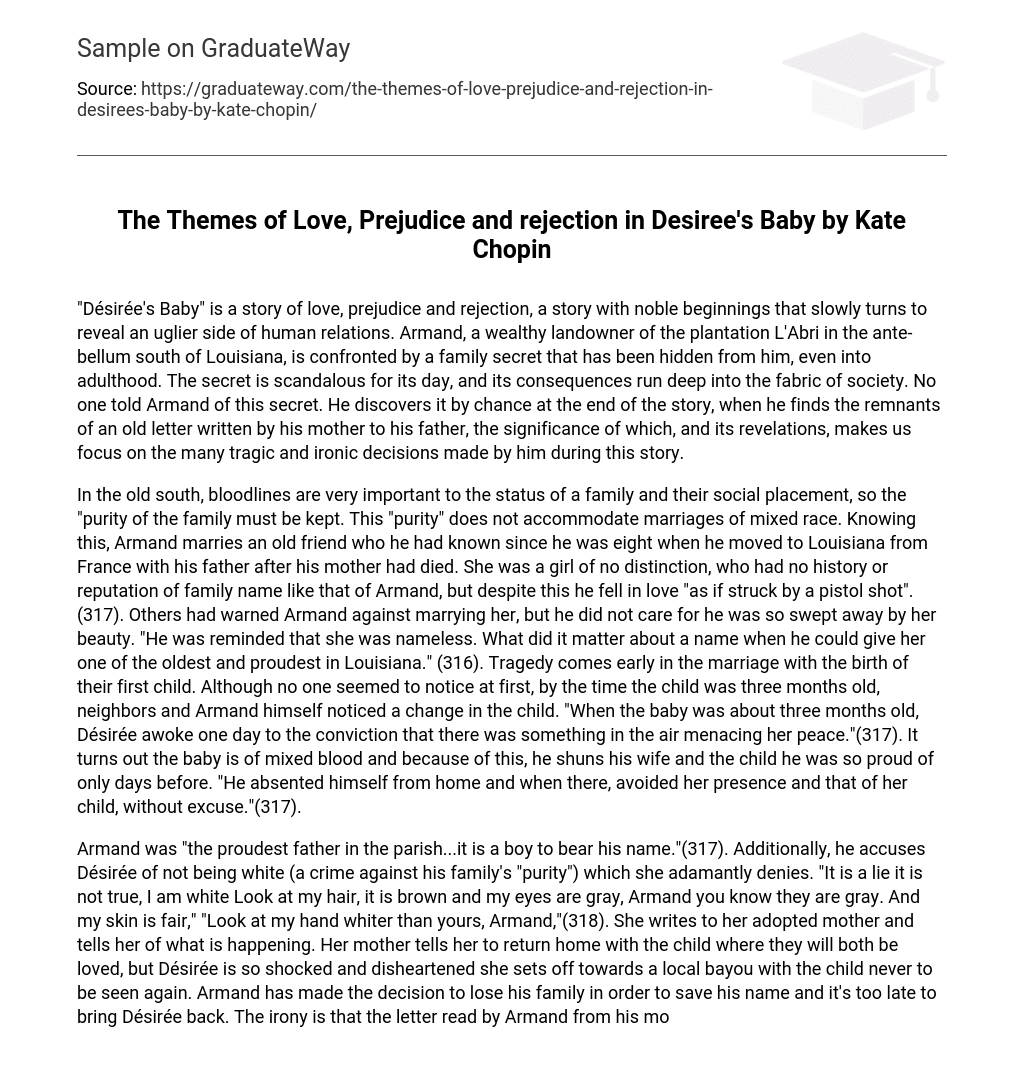“Désirée’s Baby” tells the tale of love, prejudice, and rejection. It unfolds a narrative of noble origins that gradually unfolds a darker side of human relationships. Armand, a affluent landowner at the L’Abri plantation in pre-Civil War Louisiana, is faced with a family secret that has been kept hidden from him well into his adulthood. This secret is scandalous for its time and holds profound repercussions within society. No one had informed Armand of this secret. Its existence is accidentally revealed to him towards the story’s climax when he stumbles upon the remnants of an old letter composed by his mother to his father. The significance of this letter and its revelations draw attention to the numerous tragic and ironic choices made by Armand throughout the story.
In the southern region of the United States, maintaining bloodline purity is crucial for a family’s status and social standing. Inter-racial marriages are not accepted in order to preserve this “purity”. Armand, who had moved to Louisiana from France with his father after his mother’s death, disregards this societal norm and marries an old friend. Despite her lack of family name or reputation, Armand falls deeply in love with her. Although warned by others, he is infatuated with her beauty and believes he can give her a prestigious name. However, tragedy strikes early in their marriage when their first child is born. Slowly, neighbors and even Armand himself notice a change in the child when it reaches three months old. Désirée, sensing a threat to her peace, realizes that something is amiss. It is revealed that the child has mixed blood, leading Armand to reject his wife and the child he once proudly embraced. He begins avoiding both of them without any justification or explanation.
Armand is depicted as a proud father, who is delighted by the birth of his son and believes the child will bear his name (317). However, he accuses Désirée of not being white, which goes against his family’s emphasis on “purity” (318). Désirée passionately denies this accusation, citing her brown hair, gray eyes, fair skin, and even comparing her hand to Armand’s to prove her whiteness. Feeling distraught, she writes to her adopted mother for support. In response, her mother advises her to return home with the child, assuring them both love. Nevertheless, Désirée is so deeply affected by the situation that she decides to flee to a nearby bayou with her child, never to be seen again. Armand’s decision to sacrifice his family in order to protect his name proves irreversible; it is too late to retrieve Désirée. Irony ensues when Armand reads a letter from his mother, which reveals that he is actually the one with mixed blood, not Désirée.
Placing blame on external forces can be a tragic and misguided reaction to the events people face. Armand makes this mistake when he attributes his anguish to God and blames Him for what he perceives as a cruel injustice. He believes that God is exacting revenge on him by stabbing his wife’s soul. Ironically, in a letter Armand discovers from his mother, she praises God for orchestrating their lives so that they could marry in a racist world and have a beautiful child like Armand. However, this arrangement is also the source of his present-day problems. If Armand had known about his heritage beforehand, he likely would have approached life differently. But it can be assumed that this information was concealed from him to protect him from the society they lived in. Armand’s rejection of Désirée was not only an attempt to get back at God but also to retaliate against those he felt were accountable for his personal circumstances.
Tragedy ensued as Armand felt compelled to rid himself and his family name of the unfortunate situation. at the conclusion of the narrative, Armand commanded his slaves to construct a large bonfire on the estate grounds, where he expected to dispose of all of Désirée’s and the baby’s belongings. It is within this tumultuous and impulsive moment that Armand unearths his family’s secret, upon discovering his mother’s letter. At this juncture, the story culminates, revealing its tragic irony. Before Armand lay evidence that it was not Désirée who possessed tainted lineage but rather himself. The wife and child whom he cherished but so easily discarded to safeguard his family’s reputation were innocent of his animosity and accusations. One can only envision the heart-wrenching turmoil he must have experienced in that instance. Moreover, it becomes apparent that his father had triumphed over similar adversities, embracing love for a black woman while upholding the family’s honor—a feat Armand failed to achieve. The discovery of this letter unveils to readers the profound repercussions of decisions rooted in prejudice and concerns about society’s perception. Every action Armand took—abandoning his marriage, condemning their child, incinerating all reminders of them, and blaspheming God for his misfortune—crushed down upon him the moment he stumbled upon a seemingly insignificant yet tragically significant letter.





